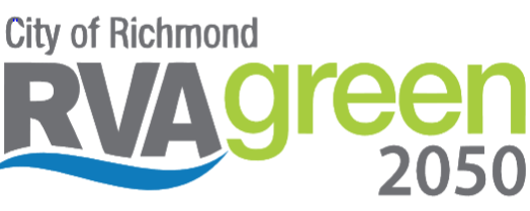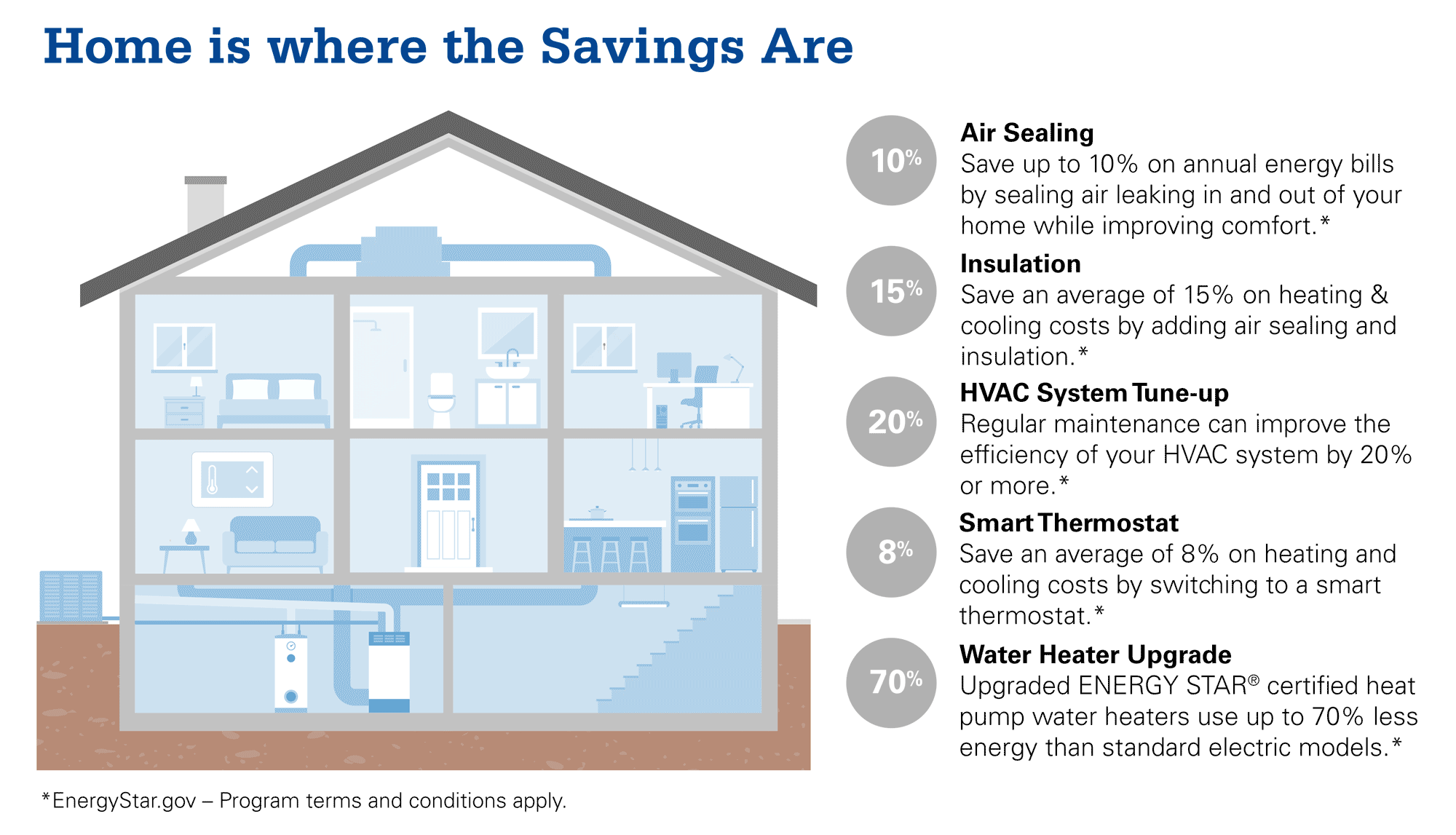
Energy Education
Making smart energy choices can enhance your home's energy efficiency and comfort, while simultaneously reducing costs and lowering the greenhouse gas emissions that contribute to climate change.
Where to Start
-
Getting started with energy savings at home is easier than you might think! Simple changes can add up to significant cost reductions and a smaller environmental footprint. Begin by switching to energy-efficient LED lighting throughout your home. You can also make a big impact by adjusting your thermostat; lower it by seven degrees or more when the house is empty or while you're asleep. Remember to be diligent about turning off and unplugging appliances and electronics that aren't in use, and consider using power strips as a convenient way to shut off multiple devices at once. When doing laundry, opt for cold water washes to save on heating costs. Finally, ensure your heating and cooling systems are working efficiently by keeping air vents clean and clear of furniture, and take advantage of resources like the Free Dominion Energy quiz for personalized energy-saving tips. These initial steps are a great way to start your energy-saving journey.
-
Once you've mastered the basics, you can take your energy savings to the next level with some intermediate actions. Start by focusing on preventing energy loss through your home's envelope by sealing air leaks around windows and doors with caulk and weatherstripping. When it's time to replace older or malfunctioning appliances, make the smart choice to upgrade to ENERGY STAR certified models, which are significantly more energy-efficient. Reducing heat loss in your water heating system is another key step; consider insulating your hot water heater and accessible hot water pipes. Finally, gain more control and automation over your home's temperature by installing a smart thermostat, which can learn your habits and adjust heating and cooling for optimal efficiency and savings. These steps require a bit more effort and investment but will yield noticeable improvements in your energy consumption and utility bills.
-
For those looking to maximize their energy savings and create a truly efficient home, expert-level upgrades involve more significant investments and modifications. This includes adding insulation to walls and the attic, paying special attention to often-overlooked gaps behind wall outlets where insulation is commonly missing. Replacing older windows with high-performance, energy-efficient models can drastically reduce heat transfer. Consider upgrading your water heating system to more efficient options like a heat pump water heater or an on-demand (tankless) water heater. Finally, a major step towards energy independence is to solarize your home by installing solar panels. To determine if solar is a good fit and to identify the most impactful expert-level upgrades for your specific situation, it's highly recommended to schedule home energy audits or take advantage of free consultations. These assessments will provide tailored recommendations for optimizing your home's energy performance.
Build your Toolbox
-
Solar Energy Incentives
Virginia Solar Incentives, Tax Credits & Rebates (2025 Guide) - This Old House:
This guide provides an overview of solar incentives available in Virginia, including the federal tax credit, property tax exemptions, and Solar Renewable Energy Credits (SRECs).
Virginia Solar Incentives & Rebates | Dominion Energy Solutions:
This page from Dominion Energy Solutions outlines solar incentives available in Virginia, including the federal tax credit, net metering, and potential local property tax exemptions.
EnergySage - Virginia Solar Incentives, Tax Credits & Rebates 2025:
EnergySage offers a detailed look at solar incentives in Virginia, including the federal Residential Clean Energy Credit and the state's SREC program.
Energy Efficiency Incentives and Rebates
Virginia Department of Energy - Programs and Financial Incentives:
This page provides a comprehensive list of various energy efficiency programs and financial incentives available in Virginia for residents, businesses, and industries. It includes information on tax exemptions, the Weatherization Assistance Program, and links to utility-specific programs.
Dominion Energy Virginia - Energy Star Products:
This page details instant rebates available to Dominion Energy Virginia residential customers for purchasing ENERGY STAR certified appliances and other energy-efficient products through their online marketplace and at select retailers.
Dominion Energy Virginia - Home Energy Evaluation:
Learn about home energy assessments offered by Dominion Energy, which can help identify energy-saving opportunities and may provide access to rebates for larger-scale improvements like insulation and air sealing.
This website, associated with Appalachian Power (another utility serving parts of Virginia), lists rebates available for ENERGY STAR appliances and their Home Performance Program.
Home Energy Rebates Frequently Asked Questions - Virginia Energy:
This page provides information about the new Home Energy Rebate programs funded by the Inflation Reduction Act, which are anticipated to become available in Virginia in the second half of 2025.
Federal Energy Efficiency Tax Credits
Energy Efficient Home Improvement Credit | Internal Revenue Service:
This IRS page provides detailed information about the tax credit for making qualified energy-efficient improvements to your home. It covers eligible improvements, credit limits, and how to claim the credit using Form 5695.
Home energy tax credits | Internal Revenue Service:
This IRS page offers a broader overview of home energy tax credits, including both the Energy Efficient Home Improvement Credit and the Residential Clean Energy Credit (for solar, wind, etc.).
Energy Efficient Home Improvement Credit: How It Works, Qualifying Expenses - NerdWallet:
This NerdWallet article explains the Energy Efficient Home Improvement Credit, outlining eligible expenses, credit limits, and how to claim it.
Home Upgrades | Department of Energy:
This Department of Energy page provides information on various home energy upgrades and mentions potential federal tax credits associated with them.
-
Dominion Energy - Home Energy Evaluation Program:
Learn how Dominion Energy Virginia helps customers understand their home energy use through in-home assessments conducted by participating contractors. Discover potential energy savings and identify opportunities for rebates on energy-efficient upgrades.
Viridiant - Home Energy Audit/ Energy Consulting:
Determine your home's energy efficiency with Viridiant's professional home energy audits. Understand where your energy dollars are going and receive a detailed report with recommendations for improvement. Schedule your audit after registering.
Department of Housing and Community Development - Weatherization Assistance Program (WAP):
Explore resources and information provided by the Virginia Department of Housing and Community Development related to improving energy efficiency in residential homes. This section may include links to state-level programs and general guidance for homeowners.
U.S. Department of Energy - Home Energy Audits:
Access comprehensive information from the U.S. Department of Energy about the benefits of home energy audits, what they entail, and how to find qualified professionals. Learn about different types of audits and what to expect from the process.
RESNET (Residential Energy Services Network) - Find a Certified Home Energy Rater:
Use RESNET's online tool to locate certified Home Energy Raters in the Richmond, Virginia area. RESNET is a leading industry standard for home energy audits and ratings. Choosing a certified rater ensures a qualified professional conducts your evaluation.
Tips for DIY Home Energy Audits:
Find practical tips and guidance from the Department of Energy's Energy Saver website on preparing for a home energy audit, understanding the results, and implementing recommended energy-saving measures. Check out their Energy Saver 101 Infographic for a home energy audit checklist.
-
A renewable energy certificate, or REC (pronounced: rěk, like wreck), is a market-based instrument that represents the property rights to the environmental, social, and other non-power attributes of renewable electricity generation. RECs are issued when one megawatt-hour (MWh) of electricity is generated and delivered to the electricity grid from a renewable energy resource.
Center for Resource Solutions (CRS) - Understanding Renewable Energy Certificates:
Access in-depth information from the Center for Resource Solutions, a leading expert on renewable energy and energy efficiency. This resource provides a comprehensive understanding of RECs, their market dynamics, and their environmental impact.
Learn about Renewable Energy Certificates (RECs), sometimes called "green tags," which represent the environmental benefits of renewable electricity. Dominion Energy offers options for customers to purchase RECs to support renewable energy and offset their electricity's environmental impact.
U.S. EPA - Renewable Energy Certificates (RECs):
Understand the basics of Renewable Energy Certificates (RECs) as explained by the U.S. Environmental Protection Agency. This resource clarifies what RECs are, how they work, and their role in tracking and supporting renewable energy generation.
Green-e - Certified Renewable Energy:
Explore Green-e, an independent certification program for renewable energy. Learn about the importance of third-party certification when purchasing RECs to ensure quality and transparency. Find Green-e certified REC providers.
-
Part 1: Understanding Green Building
U.S. Environmental Protection Agency (EPA) - Green Building:
Learn the fundamentals of green building from the U.S. EPA. This resource explains the concept, its benefits (environmental, economic, and social), and key areas of focus like energy efficiency, water conservation, and material selection.
U.S. Green Building Council (USGBC) - What is Green Building?:
Explore the definition and principles of green building as defined by the U.S. Green Building Council, the creators of the LEED (Leadership in Energy and Environmental Design) rating system. Understand the key aspects of sustainable building practices.
Part 2: Green Building Guidelines and Rating Systems
U.S. Green Building Council (USGBC) - LEED (Leadership in Energy and Environmental Design):
Learn about LEED, the most widely used green building rating system globally. Understand how LEED provides a framework for designing, constructing, operating, and maintaining resource-efficient, high-performing, healthy, and cost-effective buildings.
ENERGY STAR for Buildings and Homes (U.S. EPA):
Explore the ENERGY STAR program for certifying energy-efficient buildings and homes. Learn how this widely recognized label helps identify and promote top-performing properties in terms of energy conservation. (For Commercial Buildings)
The WELL Building Standard focuses on the health and well-being of building occupants. Understand how it addresses factors like air and water quality, light, nourishment, fitness, comfort, and mind within the built environment.
Part 3: Examples of Green Building in Action
Explore how Timmons Group contributed to sustainability in Richmond with Dominion Energy's new downtown office tower. This project showcases sustainable building practices in a large commercial development within the city.
Evergreen Homecrafters, based in the Richmond area, focuses on environmental stewardship by building custom green homes with a commitment to minimizing their environmental footprint in the home building industry. Visit their website to see examples of their green building practices.
Discover the James A. Buzzard River Education Center, a project by the James River Association that incorporates green building principles in its design and operation. As a center focused on river education and conservation in the Richmond area, its sustainable features can serve as an example of environmental stewardship in the built environment.
Programmable thermostats conserve energy and lower bills. Source
Sustainability Guide Resources









